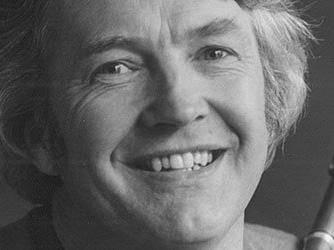Peter Lloyd: Leading British flautist who established an international reputation at the London Symphony Orchestra
He was heard in many of its finest performances under conductors as diverse as Sir Colin Davis, Leonard Bernstein, Claudio Abbado, André Previn, Bernard Haitink and Sir Georg Solti

If the popularity of the flute today rivals that of the 18th century when its patrons included Frederick the Great, then its reputation is in no small measure due to the talents of Peter Lloyd.
Without doubt one of the greatest British flautists of the second half of the 20th century, he was perhaps the last survivor of the families of wind principals who so dominated the British orchestral scene throughout that period.
Likewise, an outstanding teacher, his total dedication proved pivotal in helping mould the creative personalities of many of this country’s most eminent practitioners.
One of three brothers, born in Dorset to a financial analyst, Peter Lloyd was educated at Dauntsey’s School in Wiltshire.
There his prodigious talents, both scholastic and musical rapidly came to the fore.
Exempted from National Service due to asthma, a condition that troubled him throughout his life, Lloyd then moved to the Royal College of Music where he studied the flute with Edward Walker.
At the same time a member of the National Youth Orchestra of Great Britain, surprisingly, his services were soon dispensed with, his playing deemed not up to standard.
For three years, from 1953 until 1956, Lloyd began his professional career with the Scottish National Orchestra.
He then further refined his technique by moving to Paris to undertake intensive study with Fernand Caratgé.
Back in England he moved to Manchester for an initial spell with the BBC Northern Orchestra, before returning to spend a further three years with the Scottish National Orchestra as first flute in 1958. After further refining his technique, again in Paris, but this time with Jean-Pierre Rampal, it was back to Manchester and a second spell with the BBC Northern.
By now emerging as the leading flautist of his generation, as a performer, Lloyd revelled in the unique opportunities afforded by the instrument, his colourful and virtuosic playing rarely failing to make an impact. Over the years his seemingly effortless delivery, unerring accuracy, warm tone and sensitive interpretations endeared him to audiences worldwide.
Likewise, his sense of humour, generous spirit and impeccable timing won him the high regard of colleagues. He was also a regular at Abbey Road, his artistic palette embracing everything for the film scores of John Williams to the latest pop offerings.
In 1967, Lloyd’s outlook found a particularly happy and expressive outlet when he moved to London to spend 20 years with the London Symphony Orchestra. Soon noted as a section leader with a soloist’s personality, happy to share the principal’s chair with William Bennett, his brilliant and incisive sound became one of the glories of the orchestra. A leading light in the LSO’s Discovery programme, he was heard in many of its finest performances under conductors as diverse as Sir Colin Davis, Leonard Bernstein, Claudio Abbado, André Previn, Bernard Haitink and Sir Georg Solti.
While engaged in extensive orchestral, concerto and recital work, chamber music increasingly came to the fore. A member of the Sonar Ensemble, the English Taskin players, he also joined his LSO colleagues such as Jack Brymer, Derek Wickens, and Martin Gatt in the Barry Tuckwell Wind Quintet.
In the company of the pianist, Rebecca Holt, together they proved a formidable artistic partnership. Their authoritative advocacy, particularly of much neglected French 20th century flute repertoire, added a new dynamic to Lloyd’s already extensive and richly varied discography.
As a teacher, Lloyd was meticulous, exacting and demanding never more so than during his 20 years at the Guildhall School of Music and Drama.
Increasingly inhabiting a much more international landscape, in 1987, Lloyd moved to the US to teach and perform at Indiana University. Five years later, now back in England and settled in the Northwest, there his second wife, Thelma Handy, was leader of the Royal Liverpool Philharmonic Orchestra. Serving as professor of flute at the Royal Northern College of Music from 1993 onwards, in 1999, he was elected an honorary fellow.
Twice married, he is survived by six sons, three from each marriage.
Peter John Lloyd, musician, born 9 September 1931, died 15 April 2018
Join our commenting forum
Join thought-provoking conversations, follow other Independent readers and see their replies
Comments
Bookmark popover
Removed from bookmarks